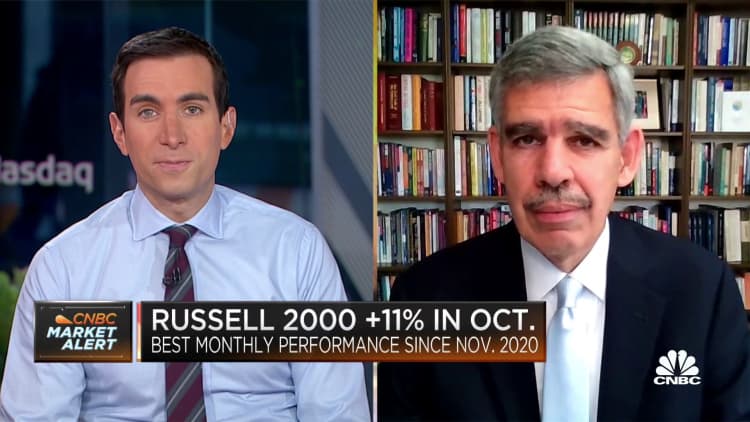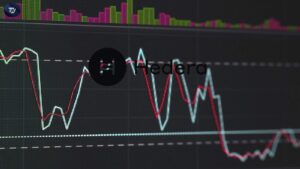https://news.google.com/__i/rss/rd/articles/CBMiTGh0dHBzOi8vd3d3LmNuYmMuY29tLzIwMjIvMTAvMzAvc3RvY2stbWFya2V0LW5ld3MtZnV0dXJlcy1vcGVuLXRvLWNsb3NlLmh0bWzSAQA?oc=5
Stock close lower, but finish October with gains
Stocks finished Monday’s session lower, but posted strong gains for October.
The Dow Jones Industrial Average fell 128.85 points, or 0.39%, to settle at 32,732.95. The S&P 500 shed 0.75% to finish at 3,871.98, while the Nasdaq Composite tumbled 1.03% to 10,988.15.
For the month, the Dow gained 13.95%, while the S&P and Nasdaq added 8% and 3.9%, respectively.
— Samantha Subin
Peaking process already underway for bond yields, JPMorgan says
Bond yields are already in a peaking process and that’s a good thing for equities if that belief catches on, according to JPMorgan.
“If the view of bond yields peaking gains traction, this would go a long way in helping the equity market stabilize, with valuation multiples that would then appear more credible,” wrote strategist Mislav Matejka in a note to clients Monday.
Matejka believes the disinflation phase is also progressing and he expects “meaningfully lower” headline and core inflation within the next three to six months.
“Finally, as economic activity has weakened closer to contraction territory, bond yields are likely to be capped by subdued levels of growth from here,” Matejka wrote.
With earnings disappointments largely digested by investors, Matejka anticipates a bounce in growth stocks and some tech names going forward. That includes an expected rebound in shares of semiconductor giant ASML.
“Tactically Growth could bounce vs Value, but both Growth and Value appear better than pure Defensives, which are very unattractively priced, even as they are inversely correlated to the bond yields direction,” he wrote.
— Samantha Subin
BlackRock says central banks are on a path to overtightening
BlackRock said the markets are rallying on hopes that policy tightening is coming to an end, which it thinks is premature.
“We see central banks on a path to overtighten policy,” Jean Boivin, head of BlackRock Investment Institute, said in a note. “We think the Fed, like other developed market central banks, will only stop when the severe damage from rate hikes is clearer.”
The asset manager said rates have already hit levels that may trigger a recession. BlackRock said it remains underweight stocks and government bonds.
“Shrinking central bank balance sheets put selling pressure on long-term government bonds and risk causing market mayhem,” Boivin said.
— Yun Li
Final trading hour in October begins
Stocks kicked off the final hours of trading in negative territory. The S&P 500 fell 0.7%, while the Nasdaq Composite tumbled 1%. The Dow Jones Industrial Average traded 130 points, or 0.4% lower.
— Samantha Subin
Midterm elections are ‘a positive tail risk’ for S&P 500, Chronert says
Investors are closely watching the upcoming midterm elections and worrying about their potential impact on equities.
But the market has other things to worry about, according to Scott Chronert of Citi. In his view, election effects will be second to the ongoing focus on Fed rate policy, inflation and recession risk.
“That said, it is hard to ignore the historical data, which points to strong positive returns for the S&P 500 in the year following midterm elections,” he wrote in a Friday note. “Rather than incorporate this into our base case for 2023, we consider it a positive tail risk.”
Data from PredictIt polls shows the likelihood of House and Senate control shifting to Republicans, resulting in a slit government. That reduces the chances of any large-scale policy reform, which could weigh on technology, media and entertainment and energy stocks. On the flip side, materials and semiconductors could do well with Republican control of both parts of Congress, according to the note.
Still, data show that the years after midterm elections are usually good for stocks.
“Interestingly, outcomes even with a recession in the subsequent year post-midterm elections are surprisingly robust,” said Chronert. Some of this may be because elections relieve volatility from uncertainty.
—Carmen Reinicke
Transportation index outperforming
The Dow Jones Transportation Index is outperforming on Monday, grinding higher by 0.7%.
The index has been red hot all month, gaining more than 13% in October. It broke above its 50-day moving average last week.
The transport sector is seen as particularly levered to the state of the economy. The index’s components include American Airlines, FedEx and J.B. Hunt Transport Services.
—Jesse Pound
Financial, industrial stocks poised to cap off strong month
Financial and industrial stocks are positioned to cap off a strong October.
The S&P 500’s industrials and financial sectors are up more than 14% and 12% this month and among top-performing areas of the market after energy, which is poised to add more than 25%.
Everest Re Group, Synchrony Financial, State Street and Prudential are among the top-performing financial stocks this month, on pace to gain at least 22% each. Goldman Sachs, Bank of America and JPMorgan Chase shares are on track to add 18%, 20.2% and 21.3%, respectively this month.
Gain from airlines stocks United Airlines and Delta Air Lines helped boost industrials in October, rising more than 34% and 22%, respectively. Caterpillar, General Electric, Lockheed Martin and Honeywell shares added to the industrials rally and are on pace to close out the month 32.5%, 26.1%, 25.5% and 21.9% higher, respectively.
— Samantha Subin
Stocks suffering big losses following earnings misses this season, Bank of America says
Third-quarter earnings season is shaping up to be another difficult one, with companies that miss expectations experiencing some of the biggest losses on record, according to Bank of America.
“Misses are getting punished, underperforming the S&P 500 by 667bps the next day, the largest in history,” wrote Bank of America’s Savita Subramanian in a note to clients Sunday. “This paints an ominous picture: 2Q11 was the closest analogy when misses underperformed by 515bps, during which the S&P 500 fell 18% peak to trough.”
Beats this season, meanwhile, have offered a smaller reward than the historic average, Subramanian said.
A raft of cuts to forward estimates and the fact that only about 50% of weaker consumer discretionary stocks have reported earnings paints a bleak picture for the months ahead and could provide more downside risk, Subramanian said.
Earnings per share are on pace for a 1% miss, while EPS estimates for the fourth quarter and 2023 have been cut by 2% month to date.
“If the trend continues, 3Q will mark only the third miss post-GFC,” she wrote. “54% of reporters (ex-Fins) had negative real sales growth.”
So far this season, industrials, services and staples stocks reign among the biggest winners as technology stocks and discretionary names fall victim to higher rates and a weakening consumer, Subramanian said.
— Samantha Subin
Stocks making the biggest moves midday
Trivariate expects a ‘slow erosion’ of economy, recommends cheap cyclical stocks
The economy will experience a “slow erosion not a dramatic implosion,” according to Trivariate Research. That makes cheap cyclical stocks attractive.
“This will not be the collapse in earnings followed by government intervention and a V-shaped recovery that were the primary features of prior cycles,” Trivariate fonder Adam Parker said in a Sunday note. “Rather, it will be a slow decline from a very high nominal GDP. If we are right, many cyclicals are just too cheap. Investors are either discounting an earnings collapse, or they are not giving the companies credit for the massive balance sheet improvement in the interim.”
Parker said energy, metals and homebuilder stocks remain attractive compared to machinery, semiconductors, capital equipment and electronic equipment, even if earnings estimates are cut 30% to 50%.
He pointed to energy as the “poster child” for cheap cyclicals, saying he maintains the view that the sector will be up 15% to 20% compared to an annual stock market appreciation of 5% to 6% over the next decade.
Parker said to expect earnings in 2024 in line with or slightly below 2023 levels.
— Alex Harring
Mike Wilson says comeback rally has a little further to go
Morgan Stanley equity strategist Mike Wilson, a prominent market bear who called 2022′s sell-off, now believes the comeback rally could last longer if the Federal Reserve turns dovish this week.
“Until next-12-month EPS estimates come down meaningfully the rally can continue, particularly if the Fed meeting leads to lower rates,” Wilson said in a Monday note. “This week’s Fed meeting is critical for the rally to continue, pause or even end completely.”
Wilson, who won the best portfolio strategist title in the latest Institutional Investor survey, said the rally can reach a range of 4,000 to 4,150 and he’s leaning toward the upper bound. A rally to 4,150 would entail a 6% gain from here. .
— Yun Li
Five stocks hit new lows, energy stocks notch fresh highs
Five stocks notched fresh lows during Monday’s trading session while a slew of energy names traded near all-time highs.
Shares of Meta Platforms traded near lows not seen since January 2016. The stock has tumbled more than 30% this month on the back of a disappointing quarterly report.
These stocks also hit new lows:
- SVB Financial Group trading at lows not seen since September 2020
- Bio-Rad Laboratories trading at lows not seen since April 2020
- Catalent trading at lows not seen since April 2020
- DaVita Inc. trading at lows not seen since April 2020
Some energy stocks, meanwhile, hit new highs. That included shares of Chevron, which trades at all-time highs dating back to its merger with Texaco in 2000. ConocoPhillips was last trading at levels not seen since its merger between Conoco and Phillips Petroleum in 2002.
Here are some of the other stocks trading near highs:
- O’Reilly Auto trading at all-time high levels back to its IPO in April 1993
- Campbell Soup Company trading at levels not seen since January 2021
- General Mills trading at all-time highs back through its history to 1927
- Hershey trading at all-time high levels back through our history to 1972
- Kellogg trading at levels not seen since November 2016
- Lamb Weston trading at levels not seen since March 2020
- Exxon trading at all-time highs back to when it was listed on the NYSE in 1920
- MetLife trading at all-time high levels back to when it became a publicly traded company in April 2000
- Principal Financial trading at all-time high levels back to its IPO in 2001.
- Everest RE Group trading at all-time highs back to its IPO in October 1995
- Elevance Health trading at all-time highs back to its IPO in November 2001
- Humana trading at all-time high levels back to its IPO as Extendicare in 1968, the company was renamed Humana in 1974
- UnitedHealth trading at all-time high levels back to its IPO in 1984
- Rollins Inc trading at levels not seen since November 2020
— Chris Hayes, Samantha Subin
Gold falls towards seventh monthly loss
Gold slipped Monday, heading towards its seventh monthly loss, weighed down by a hawkish Federal Reserve set on raising interest rates.
Spot gold shed 0.28% to $1,637.24, while gold futures were down 0.27% at $1,640.7.
A strong U.S. dollar, which is elevated because of higher interest rates, is also a drag on the precious metal, which is usually considered a safe-haven inflation hedge.
—Carmen Reinicke
Big Tech continues slide coming out of centerfold earnings week
Big Technology stocks continued to struggle as investors migrated following largely disappointing earnings reported last week.
Meta, hitting another 52-week low, is down 4.2% Monday. Its share value is 25% lower than where it opened on Oct. 24, the Monday of its earnings week. The Facebook parent beat on revenue, but came in under Wall Street expectations for earnings and issues weak guidance for the fourth quarter.
Microsoft shares were down 1.8% Monday, sitting 4.9% lower than where they opened on Oct. 24. The company exceeded expectations of both per-share earnings and revenue, but investors were disappointed when the company reported weaker-than-expected cloud revenue and gave uninspiring quarterly guidance.
Google-parent Alphabet was trading down 2.3% in trading Monday and 7.6% from where it started its earnings week. The company missed expectations for top and bottom lines and said it would cut headcount growth as it attempted to mitigate sliding ad spending.
Amazon slid 2.2% Monday to 15.6% lower than where it opened Oct. 24. Despite reporting double-digit growth in the third quarter, its revenue was below expectations. The company also expects fourth-quarter revenue to come in lower than anticipated.
Apple shed 1.8% during trading on Monday despite reporting stronger earnings compared to its Big Tech counterparts. The personal technology giant beat expectations for earnings per share and revenue, but some product-specific revenues came in under expectations, including for the iPhone. The stock is still trading 3.7% higher than where it opened Oct. 24.
— Alex Harring
Fed could provide hints about reducing the pace of rate hikes, Wells Fargo says
The Federal Reserve this week likely will provide at least a nod toward slowing the pace of interest rate increases, according to Wells Fargo.
With the market already expecting the central bank to hike its benchmark rate 0.75 percentage points when its two-day meeting concludes Wednesday, the only mystery left is what clues officials will provide about what’s ahead. Some market participants are expecting an indication that the December rate hike could be pulled down to a 0.5-point move.
“Overall, we do not believe the Fed will commit to 50bp increase in December, but we do expect them to provide language indicating it is well within the realm of possibilities,” Wells Fargo said in a client note. “There will likely be more language about the length at a restrictive Fed Funds rate, and this may be used to mitigate expected optimism with a potential ‘step-down’ function.”
San Francisco Fed President Mary Daly recently used the “step-down” language to describe where she’d like the Fed to move in its policy guidance. However, she also said she wasn’t sure when the Fed would be able to move to that posture.
Futures pricing Monday morning indicated about an 89% chance of a three-quarter point rate hike Wednesday, but just a 53% probability of cutting back to half a point in December, according to CME Group data.
— Jeff Cox
Wheat prices climb after Russia moves to curb exports
The prices of wheat and other grains jumped on Monday morning after Russia withdrew from a key grain export deal.
Russia accused Ukraine of a drone attack on its Black Sea fleet and would no longer allow exports from some Ukrainian ports in that area.
Wheat futures jumped more than 5%. Corn and soybean futures gained 2% and 1.1%, respectively.
— Jesse Pound, Holly Ellyatt
El-Erian sees a ‘meager’ chance the Fed won’t cause a recession

The Federal Reserve still can bring down inflation without wrecking the economy, but it won’t be easy, according to Mohamed El-Erian.
The Allianz chief economic advisor told CNBC’s “Squawk Box” on Monday that the chances of a recession are “uncomfortably high” though not 100%.
“Is there some possibility of a soft landing? Yes, but it is meager,” said El-Erian, also president of Queens’ College Cambridge. “For a soft landing to have happened, the Fed should have started moving a year ago and not waited and then had to front-load all these rate increases.”
El-Erian’s remarks come two days before the conclusion of the Fed’s policy meeting, during which it is expected to raise its benchmark interest rate by 0.75 percentage point.
That will be followed by Chairman Jerome Powell‘s news conference, which El-Erian said will be a balancing act between conveying that a slowdown in the pace of rate hikes is coming without setting off a major market rally that is counter to the central bank’s purposes now.
“It is really a tough balance to strike, and then there’s the financial stability issue on top of that,” El-Erian said. “So it’s going to be a fascinating press conference.”
—Jeff Cox
Emerson sells majority stake in climate technologies business to Blackstone
Blackstone is buying a majority stake in the climate technology business of Emerson Electric, the companies announced on Monday. The deal is for about $9.5 billion in cash, valuing the business at $14 billion.
The business had $5 billion in net sales in fiscal 2022, according to the press release.
Emerson, which reported $5.8 billion in long-term debt on its balance sheet as of June 30, will also sell its headquarters as part of the deal. The company has been divesting businesses under CEO Lal Karsanbhai, who took over in February 2021.
Shares of Emerson were little changed in early trading, while Blackstone’s stock was down about 1%.
— Jesse Pound
Tech stocks slide
Technology stocks were among the biggest underperformers during Monday’s trading session, pushing the tech-heavy Nasdaq Composite down more than 1%.
The S&P 500’s information technology and communication services sectors shed 1.4% and 1.6% each, dragged down by big technology stocks and semiconductors.
Advanced Micro Devices, Nvidia, Analog Devices and Qualcomm shed more than 2% each. Apple, Meta Platforms and Alphabet shares fell 1.6%, 2.8% and 1.5%, respectively.
— Samantha Subin
Chicago PMI slips in October, hits lowest level since 2020
The Chicago purchasing managers’ index, a measure of economic health in the manufacturing sector in the Midwest, fell unexpectedly in October.
The index for the month slipped to 45.2, down from 45.7 a month earlier. That fell below the consensus estimate of 47. It’s now at its lowest level since May 2020, when it fell to 32.2.
A reading of more than 50 is a bullish signal for the indicator, while one that falls below that level is considered bearish.
—Carmen Reinicke
Wynn shares jump 8% after Tilman Fertitta’s new stake
Shares of Wynn Resorts jumped 8% Monday after a filing showed billionaire investor and restaurant owner Tilman Fertitta has built a passive 6.1% stake in the casino operator.
Fertitta, who also owns NBA team Houston Rockets, bought 6.9 million shares in Wynn, according to the filing. The stock is still down about 25% this year.
— Yun Li
Stocks open lower as final trading day in October begins
Stocks opened lower as the final trading day in October kicked off.
The S&P 500 traded 0.6% lower, while the Nasdaq Composite shed 0.8%. The Dow Jones Industrial Average futures lost 170 points, or 0.5%
— Samantha Subin
JPMorgan wants to handle more of the $500 billion in annual US rent payments with its new platform
A ‘For Rent’ sign is posted near a home on February 07, 2022 in Houston, Texas.
Brandon Bell | Getty Images
JPMorgan Chase has been testing software it created for landlords and tenants that automates online rent payments, Sam Yen, chief innovation officer of JPMorgan’s commercial banking division, told CNBC.
Property managers and renters don’t need to be JPMorgan customers to sign up for the platform when it is released more broadly next year, Yen said.
Digital payments have taken over more of the world’s transactions, boosted in recent years by the pandemic, but there is one corner of commerce where paper still reigns supreme: the monthly rent check. That’s because the market is highly fragmented, with most of the country’s 12 million property owners running smaller portfolios of fewer than 100 units.
As a result, about 78% are still paid using old-school checks and money orders, according to JPMorgan. More than 100 million Americans pay a combined $500 billion annually to live in rentals, the bank said.
—Hugh Son
Barclays downgrades Amgen ahead of obesity drug update
Barclays says investors should sell shares of Amgen ahead of its update for its obesity drug slated for next week.
Analyst Carter Gould said in a note to clients Monday that despite the stock’s recent outperformance, investors have seen “sparse initial data” on the company’s drug.
CNBC Pro subscribers can read more on Barclays’ downgrade here.
— Sarah Min
Paramount falls 3% on Wells Fargo downgrade
Shares of Paramount shed more than 3% in premarket trading Monday after Wells Fargo downgraded the entertainment stock to underweight and said shares can fall more than 30%.
“We’re downgrading PARA to Underweight as we can no longer justify its premium multiple amid our more negative view on linear trends and an uncertain DTC outlook,” wrote analyst Steven Cahall.
CNBC Pro subscribers can read the full story here.
— Sarah Min, Samantha Subin
Home Depot has long-term opportunity with Pro business
Despite the current macro backdrop, Home Depot has the right strategy for long-term growth, Citi said in a note Monday.
In particular, the retailer’s Pro business, which targets professionals with larger, planned orders, is just “scratching the surface vs. the long-term potential,” wrote analyst Steven Zaccone.
“The planned purchase opportunity with the large pro is adding incremental sales and margin dollars to the business today, but is still very nascent,” he said. “After 4+ years of investment and growing traction, we believe the business is on the cusp of gaining momentum over the next several years.”
Home Depot, down 28% year to date, has nearly 14% upside to Citi’s price target.
— Michelle Fox
Brazilian stocks fall after Lula’s stunning win
The $5.5 billion iShares MSCI Brazil ETF (EWZ), the largest exchange-traded fund tracking Brazilian stocks, lost about 2.5% in premarket trading Monday after Brazilians delivered a very tight presidential victory to Luiz Inácio Lula da Silva. The election gave the leftist former president another shot at power in a rejection of incumbent Jair Bolsonaro’s far-right politics.
— Yun Li
Wynn Resorts, XPO Logistics, Petrobas among stocks moving in the premarket
These are the stocks making the biggest moves during Monday’s premarket trading session.
Wynn Resorts — Shares of the casino stock surged more than 6% in the premarket on news that investor Tilman Fertitta has taken a 6.1% stake in the resort operator, according to a Securities and Exchange Commission filing.
Petrobras — The Brazilian state-run oil company’s shares dove 8.9% in the premarket after Luiz Inácio Lula da Silva beat Jair Bolsonaro in the Brazilian presidential election.
XPO Logistics – Shares gained 2.5% after the logistics firm reported a quarterly profit of $1.45 per share and topped estimates by 10 cents a share. XPO’s revenue also topped analysts’ forecasts, helped by revenue improvement in XPO’s less-than-truckload business.
Read the full list of stocks moving here.
— Peter Schacknow, Samantha Subin
Euro zone inflation surges to record high, third quarter economic growth slows
Euro zone inflation soared by 10.7% from a year ago during the month of October as the 19-member bloc grapples with higher food and energy prices accentuated by Russia’s invasion of Ukraine.
This represents the highest monthly reading ever since the euro zone’s formation.
The data comes after countries individually reported flash estimates last week. In Italy, headline inflation came at 12.8% over the previous year while Germany said inflation jumped to 11.6%.
Some countries including Estonia, Latvia and Lithuania saw inflation rise by more than 20%.
Preliminary data released Monday also showed economic growth slow in the third quarter, with gross domestic product rising by just 0.2% in the third quarter. That’s down from an increase of 0.8% in the second quarter.
— Silvia Amaro, Samantha Subin
Wheat prices rise almost 6% after Russia pulls out of grain export deal
Global wheat prices have started to rise following Russia’s withdrawal from the Black Sea grain export deal last weekend.
The most-active wheat contract on the Chicago Board of Trade jumped 5.8% to $8.77-1/2 a bushel around midnight London time, according to Reuters, after earlier hitting a high of $8.93 a bushel. Corn and soybean prices also rose.
The increases come after Russia announced Saturday that it was suspending its involvement in the Black Sea Grain Initiative that was brokered in July and which allowed vital agricultural products to be exported from several Ukrainian ports.
Russia announced Saturday that it was withdrawing from the deal for an indefinite period after it accused Ukraine of a “massive” drone attack on the Black Sea Fleet in Sevastopol in Crimea.
Ukraine has not said whether it was responsible for the attack. President Volodymyr Zelenskyy said Russia’s withdrawal from the initiative was “rather predictable” and the global food crisis would worsen.
An aerial view of Sierra Leone-flagged dry cargo ship Razoni which departed from the port of Odesa Monday, arriving at the Black Sea entrance of the Bosporus Strait, in Istanbul, Turkey, on August 3, 2022.
Anadolu Agency | Anadolu Agency | Getty Images
Moscow’s move was “an absolutely transparent intention of Russia to return the threat of large-scale famine to Africa and Asia,” Zelenskyy said, adding that “access to food has actually worsened for more than 7 million consumers.”
The UN and Turkey, which helped Ukraine and Russia to reach the grain deal, have agreed a plan with Ukraine to help move 16 vessels (12 outbound and 4 inbound) that are stuck within the maritime corridor used to export grains.
The organization overseeing grain exports, the Joint Coordination Centre, said in a statement Sunday that “in order to continue fulfilling the Initiative, it was proposed that the Turkish and United Nations delegations provide tomorrow 10 inspection teams aiming to inspect 40 outbound vessels. This inspection plan has been accepted by the delegation of Ukraine. The Russian Federation delegation has been informed.”
— Holly Ellyatt
Goldman Sachs expects Fed rates to peak at 5%
Economists at Goldman Sachs expect the Federal Reserve funds rate to peak at 5%, after raising its forecast for the central bank to hike 75 basis points in this week’s upcoming meeting.
Economists led by Jan Hatzius said in a Saturday note that they are adding another 25 basis points to their forecasts — now calling for a 50 bps hike in December, a 25 bps hike in February, and another 25 bps hike in March.
“Inflation is likely to remain uncomfortably high for a while, which could make continuing to hike in small increments the path of least resistance,” the note said.
— Jihye Lee
CNBC Pro: These 12 cheap global stocks are expected to rally — and analysts love them
Stocks around the world have sold off this year on recession fears and soaring inflation — and are now looking cheap.
Analysts say there could be buying opportunities in some stocks that they expect to rally.
To find those stocks, CNBC Pro screened for names under the MSCI World index that met a number of criteria.
CNBC Pro subscribers can read more here.
— Weizhen Tan
Stock futures open flat
Futures were little changed when trading began at 6 p.m. ET on Sunday, with the Nasdaq 100 futures down just 0.1% and the S&P 500 and Dow futures closer to the flatline.
— Jesse Pound
Traders looking for sign of a slowdown from Fed
Wall Street will be watching the Federal Reserve statement closely this week for signs that the central bank will ease up on its rate hike pace.
According to the CME FedWatch tool, traders believe there is an 80% chance that the Fed hikes rates by three quarters of a point on Wednesday.
That would bring the central bank’s target range to 3.75% to 4%.
Beyond that, however, the market looks more uncertain. There is just a 44% probability of another hike of that size in December.
— Jesse Pound
Dow poised for best month since 1976
The major averages rose last week despite a rocky batch of earnings. All three are poised to break a two-month losing streak, and the Dow is set for its best month in more than 40 years.
Here’s where things stand:
The Dow:
- Up 5.72% last week, its fourth-straight winning week
- Up 14.40% for the month, its best month since January 1976, when it gained 14.41%
The S&P 500:
- Up 3.95% last week, its second positive week in a raw
- Up 8.8% for the month
The Nasdaq Composite:
- Up 2.24% last week, its second positive week in a row
- Up 4.98% for the month
— Jesse Pound, Christopher Hayes



















